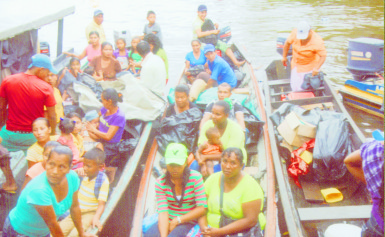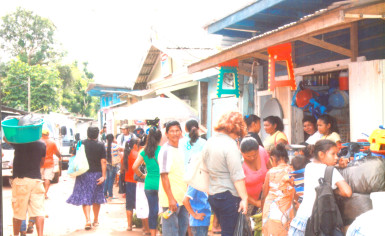With few employment alternatives now available, families in several interior communities including the township of Port Kaituma have little alternative but to continue to hitch their sails to the mast of a gold mining industry that continues to be affected by the plummeting price on the world market.

During a visit to Port Kaituma last weekend this newspaper spoke with several residents, including businessmen, whose fortunes remain firmly tied to those of the mining sector but who, perhaps somewhat belatedly, are beginning to recognize that they are hostage to a situation over which they have no control.
Well-known Port Kaituma businessman Conrad St Romain believes that there could be a hard road ahead for Port Kaituma where, the arrival of Barama Company with its logging operations and the ‘gold fever’ driven by high prices had the effect of removing many residents of Kaituma and neighboring areas away from their traditional farming moorings. Now, with Barama gone and gold prices not what they used to be there can be no question of going back to the land for those who had begun to see mining as a road to a better life.
St Romain believes that the residents of Kaituma caught on to the realities of the gold mining industry “much too late.” By that he means that by the time a few families had pooled their resources and invested in modest 4-inch dredges to work small holdings, the lands had long been allocated to bigger operators so that the people of Port Kaituma found themselves mining illegally. In 2014, a government drive against illegal mining named Operation El Dorado put paid to that.
Operation El Dorado may have been promoted as an initiative designed to bring an end to illegal mining but some of the residents have other views. They believe that what it represented was the manifestation of a powerful lobby by big miners to remove the smaller operators, residents of Port Kaituma, from the lands that had already been allocated to them. The government, some residents say, was only too willing to comply. Some talk about conspiracy theories and corrupt practises and even these days the Guyana Geology and Mines Commission (GGMC) appears reluctant to talk about El Dorado.

St Romain says that in the days prior to Operation El Dorado the efforts of the smaller miners with their smaller dredges might have yielded them between two to three ounces of gold worth about $500,000. Out of that they would have to make deductions for wages, fuel, food for the workers and transportation to fetch the fuel and food. That would leave them with around $75,000 to last the family the remainder of the week. It wasn’t much, St Romain said, but compared to what had gone before it was living of sorts.
The economic linkages did not stop there. The earnings from the smaller mining operations financed the commercial life of the township. Purchases of food, clothing, transportation and entertainment generated other small businesses and financed the livelihoods of other families.
Those residents who have now lost their livelihoods want them restored. They want the restrictions on mining imposed by Operation El Dorado removed so that the community can share the spoils of what they believe to be a birthright. The returns from the gold go elsewhere even as their horrendous roads, polluted water, unreliable electricity supply and high unemployment rates mock them.
Turning things around, however, is easier said than done. St Romain, himself a miner, points to the economic challenges facing those one-time small operators who had invested heavily in acquiring their 4-inch dredges only to have to sell them off after Operation El Dorado.
He is uncertain they can rise again but doubts they have a choice. Options, the businessman says, are few. There are few state or private sector jobs to be had at Port Kaituma and for many, survival still depends on either working for a big miner or else, becoming involved in an exercise known as “punting,” working the tailings from the bigger mining operations in the hope of ‘scavenging’ the occasional few pennyweight of gold.
The woes inflicted on account of the declining gold mining industry are reflected in the thoroughly run-down services available to the residents. The less said about Port Kaituma’s roads, the better. The pictures tell a grim enough story. It is the same with what passes for potable water. The source is a heavily polluted river. Save and except the very poor, no one drinks the water here.
St Roraima believes that Barama’s arrival in the region to pursue logging operations played a key role in opening up roads to other mining lands in the region. Those roads are no longer what they used to be. He talks about the need for investment in rehabilitating the roads between Port Kaituma and Five Star and Port Kaituma and Cuyuni. Five Star is reportedly a heavy gold-yielding area but it costs around $1 million to move a truck laden with goods from Kaituma.
Still, St Romain believes opening roads to these areas will create a new lease on life for the impoverished people of Port Kaituma. He accepts that the volatility of the gold price has become a given over which the local industry has no control. At the same time he does not appear to see an economic option to gold, even at continually falling prices.




